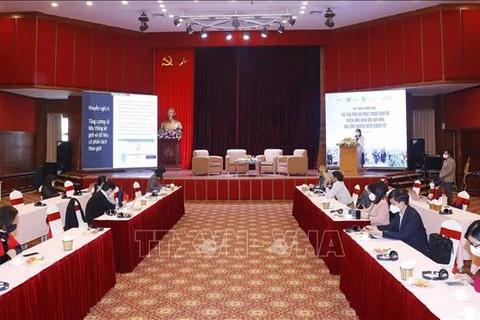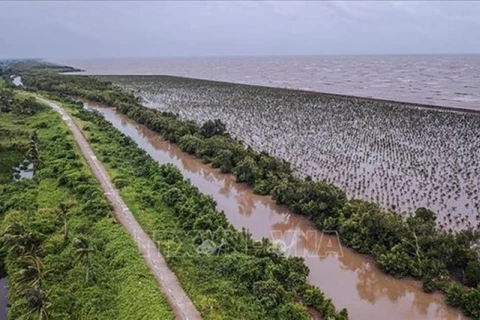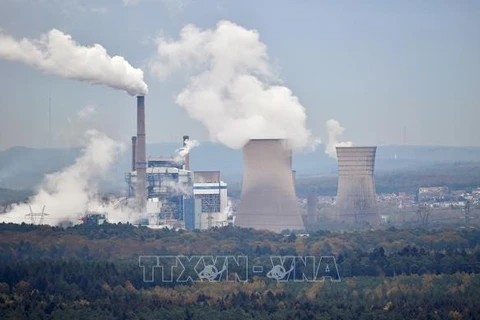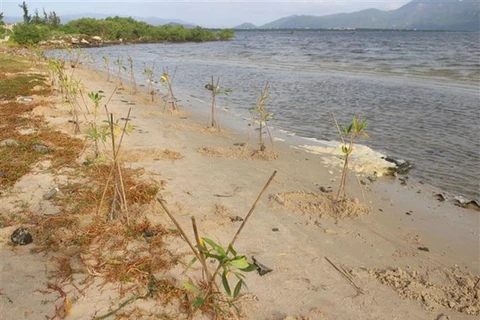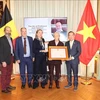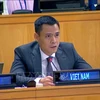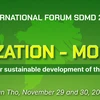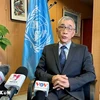 Young people take part in an afforestation activity on the coast of Cam Thanh Bac commune of Cam Lam district, Khanh Hoa province. (Illustrative photo: VNA)
Young people take part in an afforestation activity on the coast of Cam Thanh Bac commune of Cam Lam district, Khanh Hoa province. (Illustrative photo: VNA) Hanoi (VNA) – The United Nations Development Programme (UNDP) is supporting Vietnam to enhance gender mainstreaming in the National Adaptation Plans so that it is more gender-responsive and better able to meet the needs, priorities, and challenges faced by women, according to UNDP Resident Representative in Vietnam Caitlin Wiesen.
Wiesen stressed in an interview with the Vietnam News Agency (VNA) that women are hitting a glass ceiling that stops them from advancing to the highest levels of leadership in environmental protection and climate action.
The Gender Equality in Public Administration (GEPA) report compiled by UNDP and the University of Pittsburgh shows that women’s participation in ministries of environmental protection averages 33 percent globally and parity in decision-making in environmental protection is exceptionally rare.
The impacts of climate change are not gender neutral, she noted, adding that climate change often exacerbates existing inequalities between women and men, the poor and other vulnerable groups.
Numerous international climate policies, many that Vietnam is a signatory to, have recognised the dual objectives of reducing gender inequality as a key tool for delivering climate action and building resilience to the impacts of climate change.
It is clear that people who are poor, especially women and ethnic minorities, are most at risk from climate change because they have less ability to adapt to and deal with severe weather events such as storms, floods, and drought, Wiesen said.
“This is clearly seen here in Vietnam - one of the countries most impacted by climate change - from storms and floods along the coast, to saline intrusion in the Mekong Delta and drought and landslides in the Central Highlands,” she said.
Wiesen said UNDP has worked with farmers in the south-central coastal province of Binh Thuan, especially women, to save 50 percent in energy consumption for off-season dragon fruit production.
Many cooperatives have experimented with installing LED light bulbs (9w) leading to energy savings compared to using incandescent bulbs (60 - 75w). The installation of LED lights has led to a reduction of GHG emissions from the dragon fruit supply chain.
Additionally, these cooperatives have employed several water-saving solutions, such as drip irrigation or low-pressure sprinkler irrigation, resulting in better conservation of water resources that are becoming increasingly scarce due to droughts, especially in the south-central coastal provinces.
The shifting to green climate friendly agriculture has opened the way for women farmers to sell their dragon fruit in lucrative, green markets such as the EU, the UNDP Representative emphasised.
She continued to say that Vietnam experiences many storms and extreme weather events and floods, and these weather events disproportionately impact women and other vulnerable groups as they have less ability adapt to severe weather events.
UNDP, through a Green Climate Fund-financed project, is supporting vulnerable communities to enhance their resilience to storms by providing climate resilient houses.
 Caitlin Wiesen, UNDP Resident Representative in Vietnam, speaks at the launch of a crowdfunding campaign to build storm- and flood-resilient houses for poor and near-poor families in Quang Binh (Photo courtesy of UNDP)
Caitlin Wiesen, UNDP Resident Representative in Vietnam, speaks at the launch of a crowdfunding campaign to build storm- and flood-resilient houses for poor and near-poor families in Quang Binh (Photo courtesy of UNDP) As documented in previous major floods of 2020, these storm resilient houses not only protect women and their families before during and after storms, but the houses also often become safe havens for other vulnerable members of the community and enabling women to re-start their livelihoods as soon as waters recede.
Women have also participated in the design and construction of their houses and one by one are building an empowered frontline of women resilient to climate change, she added.
UNDP through the GCF project has made an important contribution with 4,000 storm resilient houses, but there is still an estimated 100,000 houses required to meet the needs of vulnerable women and their households on the climate frontlines and should be delivered in the name of climate justice.
Promoting women’s stewardship, contributions, participation and leadership are key for successful climate and environmental solutions, Wiesen affirmed./.
